A Robust Photovoltaic Power Forecasting Method Based on Multimodal Learning Using Satellite Images and Time Series
IF 8.6
1区 工程技术
Q1 ENERGY & FUELS
引用次数: 0
Abstract
Ultra-short-term photovoltaic (PV) power forecasting holds significant importance in enhancing grid stability. Most PV power forecasting methods based on satellite images rely on pixel-level predictions, which are inefficient and redundant. Meanwhile, current deep-learning approaches struggle to establish correlations between large-scale cloud features and PV generation patterns. In this paper, an end-to-end model based on multimodal learning is proposed for directly obtaining multi-step PV power forecasts from satellite images and time series. To capture cloud dynamics and features within the region of interest (RoI), ConvLSTM-RICNN is utilized to encode satellite images. To mitigate the impact of noise and missing data in PV power, a robust fusion approach named DCCA-LF is introduced. This approach integrates deep canonical correlation analysis (DCCA) into late fusion (LF) to strengthen cross-modal feature alignment. The proposed model is verified using publicly available data from BP Solar in Alice Springs and Himawari-8, from January 1, 2020, to October 8, 2022. Comparison with current state-of-the-art research shows that the suggested model achieves the best RMSE and MAE with minimal complexity across all cloud conditions. Moreover, the proposed approach is robust to noise and missing data.求助全文
约1分钟内获得全文
求助全文
来源期刊

IEEE Transactions on Sustainable Energy
ENERGY & FUELS-ENGINEERING, ELECTRICAL & ELECTRONIC
CiteScore
21.40
自引率
5.70%
发文量
215
审稿时长
5 months
期刊介绍:
The IEEE Transactions on Sustainable Energy serves as a pivotal platform for sharing groundbreaking research findings on sustainable energy systems, with a focus on their seamless integration into power transmission and/or distribution grids. The journal showcases original research spanning the design, implementation, grid-integration, and control of sustainable energy technologies and systems. Additionally, the Transactions warmly welcomes manuscripts addressing the design, implementation, and evaluation of power systems influenced by sustainable energy systems and devices.
 求助内容:
求助内容: 应助结果提醒方式:
应助结果提醒方式:


